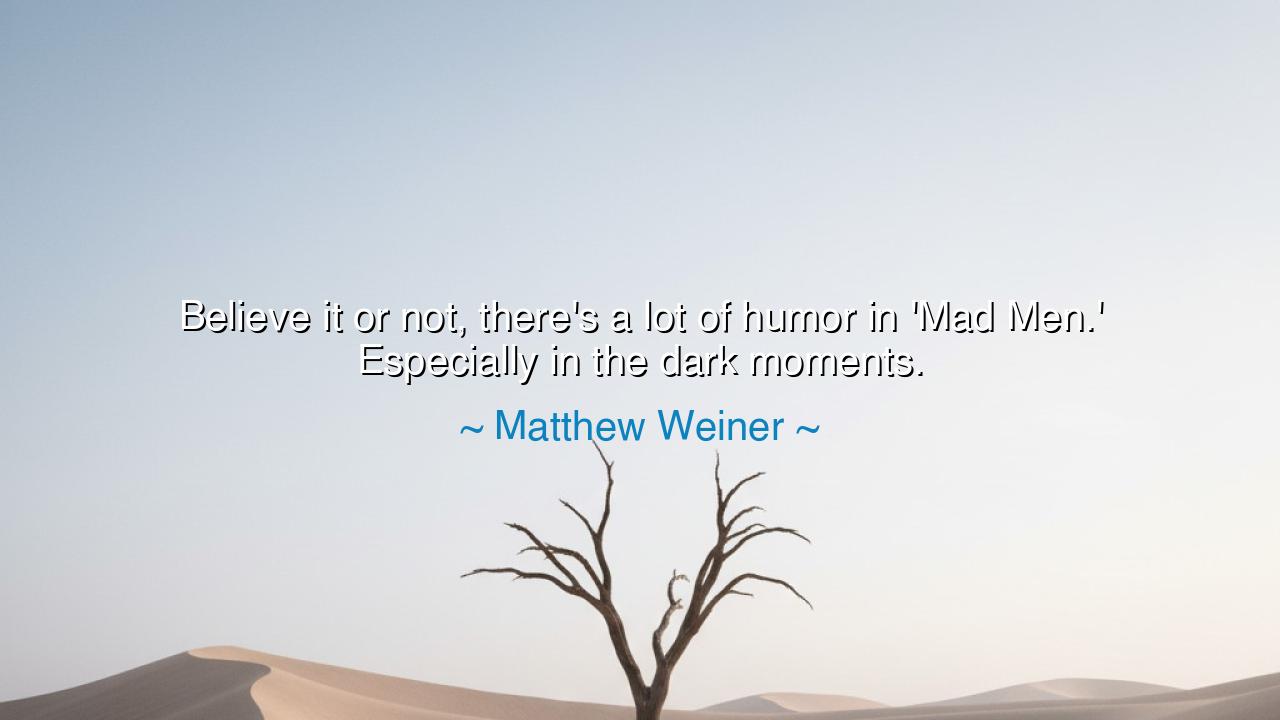
Believe it or not, there's a lot of humor in 'Mad Men.'
Believe it or not, there's a lot of humor in 'Mad Men.' Especially in the dark moments.






Hear the words of Matthew Weiner, the creator and chronicler of human longing: “Believe it or not, there’s a lot of humor in ‘Mad Men.’ Especially in the dark moments.” Though these words speak of a television tale, they reveal a wisdom that reaches far beyond the screen—a truth about the strange, eternal bond between sorrow and laughter, between darkness and the light that flickers within it. For Weiner, who built his story in the smoke and silence of the 1960s, knew that even in despair, the spirit finds its way to humor, and that to laugh amid the ruins of one’s own heart is to prove that one still lives.
The ancients, too, knew this truth well. They saw that the darkness of tragedy and the light of comedy are not opposites but reflections of one another. The poet Aristophanes, who wrote comedies that danced upon the edges of ruin, understood that laughter and pain drink from the same well. When a man laughs in the face of suffering, he defies it. His laughter becomes an act of rebellion, a cry of the soul that says, “I will not be broken.” So when Weiner speaks of finding humor in the dark moments, he reminds us that laughter is not a denial of pain—it is the soul’s resistance to it.
In the world of ‘Mad Men,’ the laughter does not come from joy, but from recognition. The characters—draped in suits, cigarettes, and secrets—walk through a landscape of longing, deceit, and disillusionment. Yet amid their failures and their masks, they find moments of absurdity, moments where the sheer weight of existence becomes, paradoxically, comic. A man weeps for meaning, yet orders another drink. A woman hides her heartbreak behind a perfect smile. These moments are darkly humorous because they are true—they mirror our own contradictions. Weiner’s humor is not cruel; it is compassionate. It sees through the tragedy to the fragile humanity beneath.
History itself offers many mirrors to this wisdom. Consider Winston Churchill, who guided his nation through the terrors of war. Even as bombs fell upon London, he wielded humor like a shield. When asked how he could joke while the world burned, he replied, “If I didn’t laugh, I would cry.” Like the characters of Weiner’s creation, Churchill understood that humor is not an escape from darkness but a lamp within it. In the smoke of battle and the rubble of despair, laughter kept the spirit alive. The same laughter that echoes in Mad Men’s darkest scenes has echoed through every age where men have suffered and yet refused to surrender their humanity.
The origin of this kind of humor lies in empathy. To find humor in darkness is not to belittle suffering, but to face it honestly—to say, “Even in pain, I see life’s strange beauty.” The ancient Stoics taught this in another form: they believed that one must look upon the world’s chaos with both acceptance and a wry smile. For to despair is to forget the vastness of the human heart, and to laugh, even softly, is to remember it again. Weiner’s art, like theirs, reminds us that laughter is the breath of endurance.
Yet this wisdom demands courage. It is not easy to laugh when shadows fall, nor to find light in failure. It requires one to stand still amid the storm and say, “There is still something worth loving in this.” The humor that lives in darkness is not the humor of mockery, but of mercy. It sees the flaws, the foolishness, the vanity—and forgives them. It says: we are all broken, but in our brokenness, we are together. Such laughter becomes a kind of prayer, an act of healing.
So let this lesson be passed down to those who walk through their own dark times: seek the humor that redeems, not the laughter that escapes. When life feels heavy, do not turn away from it—watch it closely, and you will see that even sorrow has its irony, and even loss carries its light. Laugh not because pain is small, but because the human heart is vast. Let your humor be gentle, your laughter sincere, and your awareness deep.
For as Matthew Weiner teaches, the light of humor often burns brightest in the darkest moments. It is the flame that survives when all else fades—the proof that the human soul, though battered, still sings. To laugh amid darkness is not to deny it, but to transform it—to take the ashes of despair and turn them into something beautiful, something true, something that whispers to the generations to come: “Even in our sorrow, we did not forget to smile.”






AAdministratorAdministrator
Welcome, honored guests. Please leave a comment, we will respond soon